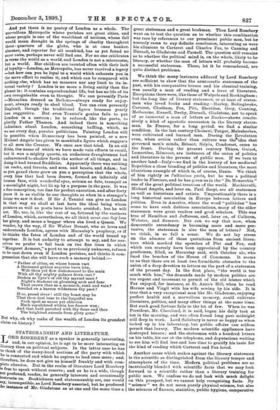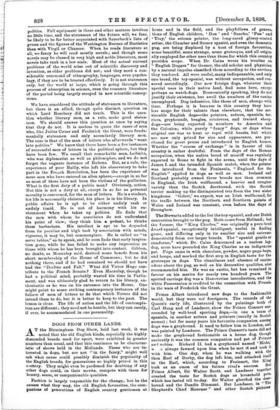STATESMANSHIP AND LITERATURE.
LORD ROSEBERY as a speaker is generally interesting, and, in our opinion, he is apt to be more interesting on literary than on political subjects. In the latter case he has to think of the many-hued sections of the party with which he is connected and which he aspires to lead once more ; and, therefore, he does not give us himself frankly and with com- plete abandon. But in the realm of literature Lord Rosebery is free to speak without reserve ; and as he is a wide, though not profound, reader, he generally interests and occasionally instructs us. Bookishness and statesmanship are, one would say, incompatible, as Lord Rosebery asserted, but he produced the instance of Mr. Gladstone as at one and the same time a
great statesman and a great bookman. Then Lord Rosebery went on to test the question as to whether this combination was rare by references to our prominent public men, but he scarcely came to any definite conclusion, interesting as were his allusions to Carteret and Charles Fox, to Canning and Disraeli, to Gladstone and Parnell. The question still remains as to whether the political mind is, on the whole, likely to be literary, or whether the man of letters will probably become a successful statesman. These, let it be remembered, are quite distinct problems.
We think the many instances adduced by Lord Rosebery are sufficient to show that the aristocratic statesman of the past, with his comparative leisure and his classical training, was usually a man of reading and a lover of literature. Exceptions there were, like those of Walpole and Rockingham ; but the long line of literary statesmen, or at least of states- men who loved books and reading—Harley, Bolingbroke, Carteret, Chatham, Fox, Pitt, Sheridan, Grey, Canning, Melbourne, Russell, Derby, Disraeli, Gladstone, not to speak of so immortal a man of letters as Burke—shows conclu- sively a kind of apostolic succession in the literary states- man. In France, for a long period, we find a similar condition. In the last century Choiseul, Turgot, Malesherbes, were cultivated and learned men. During the Revolution even, when action rather than culture was the4idea that governed men's minds, Brissot, SieyCs, Condorcet, came to the front. During the present century Thiers, Guizot, Lamartine, Remusat, are instances of the union of politics and literature in the persons of public men. If we turn to another land—Italy—we find in the history of her mediaaval Republics a close blending of politics and literature, the most illustrious example of which is, of course, Dante. We think of him rightly as l'altissima poeta, but he was a political leader in Florence, and he has given us in the " De Monarchia" one of the great political treatises of the world. Machiavelli, Michael Angelo, and later on, Paul Sarpi, are all statesmen as well as historians and artists. Unquestionably there is a long historical association in Europe between letters and politics. Even in America, where the word " politician " has come to have such dubious associations, many of the older statesmen were great readers and good scholars. This was true of Hamilton and Jefferson, and, later on, of Calhoun, Webster, and Sumner. But can we say that now, when democratic ascendency is becoming more and more per7 vasive, the statesman is also the man of letters ? Not, we think, in so full a sense. We do not lay stress on the absence of those quotations from ancient litera- ture which marked the speeches of Pitt and Fox, and which can scarcely have been appreciated by the country gentlemen, filled, as Macaulay said, with October ale, who lined the benches of the House of Commons. It seems to us that there are at least two formidable obstacles to the union of a deep devotion to letters on the part of a statesman of the present day. In the first place, "the world is too much with him," the demands made by modern politics are too urgent and incessant to permit of the old leisure which Fox enjoyed, for instance, at St. Anne's Hill, when he read Horace and Virgil with his wife sewing by his side. It is true that a very exceptional man like Mr. Gladstone, enjoying perfect health and a marvellous memory, could cultivate literature, politics, and many other things at the same time. Bat such good fortune falls to the lot of few. When he was President, Mr. Cleveland, it is said, began his daily task at ten in the morning, and was often found long past midnight still deep in work. Lord Salisbury is never so happy as when locked up in his laboratory, but public affairs can seldom permit that luxury. The modern scientific appliances have destroyed leisure ; and the statesman with a hundred letters on his table, his ear at the telephone, and deputations waiting to see him will find less and less time to gratify his taste for the kind of reading which Carteret and Fox loved.
Another cause which makes against the literary statesman is the scientific as distinguished from the literary temper and atmosphere of the time. Modern political problems are so inextricably blended with scientific facts that we may look forward to a scientific rather than a literary training for public men. We confess we do not look with much delight on this prospect, but we cannot help recognising facts. By " science " we do not mean purely physical science, but also the sciences of finance, statistics, public hygiene, comparative
tions. justify their existence, but swell the numbers of the canine We have considered the attitude of statesmen to literature, unemployed. Dog industries, like those of men, change with but there is an allied, though quite distinct, question on time. Perhaps it is because in this country they have less scope for their talents than elsewhere, that the ser. tion whether literary men, as a rule, make good states-
which Lord Rosebery did not touch. This is the goes-
tion English dogs—the pointers, setters, spaniels, ter- men. We should answer this question at once by saying riers, greyhounds, beagles, retrievers, and trained sheep. that they do not. It is useless to quote the cases of men dogs—are being exported in numbers to America and who, like Julius Cmsar and Frederick the Great, were funda-
the Colonies; while purely " fancy " dogs, or dogs whose mentally statesmen and only secondarily literary men. original use was to hunt or repel wild beasts, but which The case is that of the man of letters who afterwards " went are now only prized for size and appearance, are put- into politics." We know that there have been a few instances chased for great prices and introduced to English homes. of successful men of letters in the political sphere, but they Whether the course of exchange is in favour of this have been few. We recall that remarkable man, Leibnitz, country is rather doubtful. From the days of the Roman who was diplomatist as well as philosopher, and we do not occupation, when the native breed of mastiff was regularly forget the cognate instance of Rubens. But, as a rule, the exported to Rome to fight in the arena, until the days of experience of poor Bailly, who left his observatory to take James I. and the intended Spanish match, when the pointer " part in the Freach Revolution, has been the experience of was introduced from the Peninsula, England for the most men who have entered an alien sphere,—except in so far English" applied to dogs as well as men. Ireland and as most of these have not been the victims of the guillotine. Scotland probably owned three breeds not then common What is the first duty of a public man P Obviously, action. in England, the Irish wolfhound, a heavier and rougher But this is not a duty at all, except in so far as personal variety than the Scotch deerhound, with the Scotch morality is concerned, for the man of letters. He is a student, terrier making up the distinguished trio from the two sister his life is necessarily cloistral, his place is in his library. In kingdoms. Gelert, we expect, was an Irish wolfhound, for public affairs he is apt to be either unduly rash or the traffic between the Northern and Southern points of unduly timid. He is out of harmony with his en- vironment when he takes up politics. He finds that Strongbow.
the men with whom he associates do not understand The Stewarts added to the list the toy-spaniel, and our Dutch his point of view; they think him a pedant, be thinks connection brought us the pug. Both came from Holland ; but them barbarians. His intellect is apt to be degraded the former, the " King Charles," was originally a pure-bred from its peculiar and high task by association with minds, dwarf-spaniel, exceptionally intelligent, useful in finding vigorous, it may be, but commonplace. He is called on "to game, and differing only in its smaller size and extreme serve tables," so to speak, and he soon finds that early inspira- domesticity from our larger breeds. The " spaniel gentle or Pion gone, while he has failed to make any impression on comforter," which Dr. Caine denounced as a useless lap- those with whom he has been brought into contact. Gibbon, dog, must have preceded the King Charles as an indigenous no doubt, as Macaulay said, derived some benefit from his pet. Pugs came in with chocolate, powder, negro page-boys, short membership of the House of Commons ; but he did and hoops, and marked the first step in English taste for the nothing there, and if he had remained we should not have grotesque in dogs. The cleanliness and absence of canine had the "Decline and Fall." What did Victor Hugo con- odour about the pug, as well as his decorative qualities, also tribute to the French Senate P Even Macaulay, though he recommended him. He was an exotic, but has remained in bad a political mind, probably wasted his time in Parlia- favour on his merits for nearly twe hundred years. The ment, and was ultimately glad to return to his library, en- spotted carriage dog was a Hanoverian introduction, and the thusiastic as he was on his entrance into the House. One white Pomeranian is credited to the connection with Prussia might point to some striking contemporary instances of the in the wars of Frederick the Great.
failure of men of letters to do that which Nature did not Prince Albert introduced new dogs to the fashionable intend them to do, but it is better to keep to the past. The world, but they were not foreigners. The records of the lesson is clear. The life of action and the life of contempla- Queen's early life, illustrated by the paintings both of tion are different ; they need not be hostile, but they can rarely, Carl Haag and of Landseer, show the Prince Consort ear-
if ever, be accommodated in one personality. rounded by well-bred sporting dogs,—in one a team of























































 Previous page
Previous page